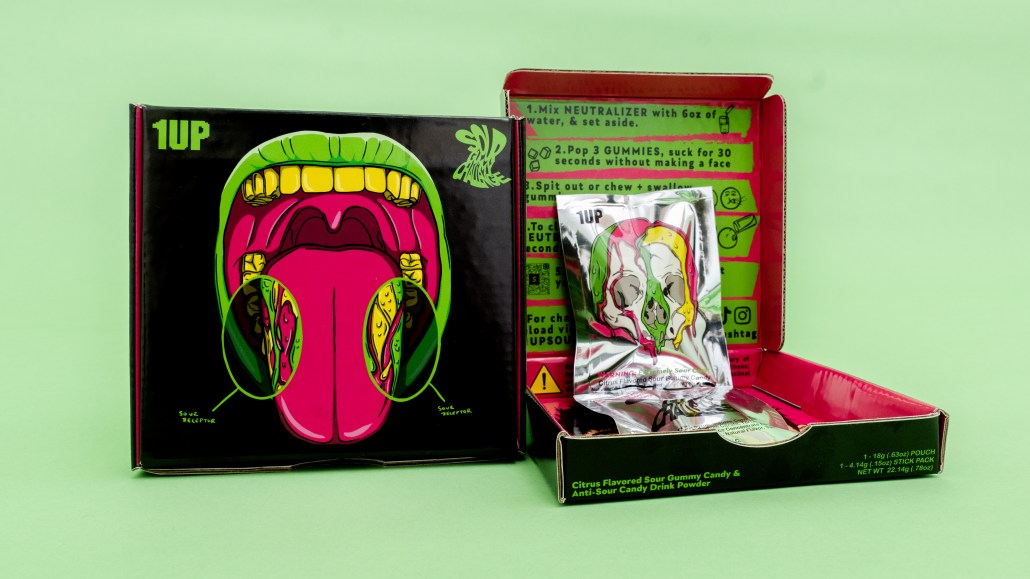Save 50% on a 3-month Digiday+ membership. Ends Dec 5.
Why FaZe Rug is the latest esports influencer to join the DTC brand craze

Over the past year, esports organizations and influencers alike have leaned into direct-to-consumer products in their search for sustainable revenue streams. Today, Brian “FaZe Rug” Awadis has become the latest industry leader to join the fray with the launch of 1UP Candy, a DTC candy business with a focus on the Gen-Z livestreaming audience.
The company is kicking off with a limited production run of a sour gummy, which the company plans to promote through a social media challenge spread via the channels of Awadis and other livestreamers. 1UP has also partnered with Cash App to market their candy, offering exclusive access to Cash App Card holders for 72 hours before the general public can purchase it.
1UP Candy is privately funded by Awadis and his co-founder and CEO, Matt Weiss. “In the world of CPG, where a lot of the burn comes from is when you go right out of the doors into brick-and-mortar,” Weiss said. “We want to start off DTC, so when you talk about financing and fundraising, all of these things really allow us to be a bit more lean, because we’re able to leverage Brian’s audience.”
Esports companies have spent years selling team merchandise directly to their fans, but Awadis’ candy venture reflects how the industry has gradually diversified its DTC offerings to include more far-out products such as energy drinks and even influencer-branded bidets. As some brands pull away from esports sponsorships, esports orgs are feeling the pressure to be less dependent on partnership revenue, and DTC commerce is an appealing option.
After all, many esports orgs’ most valuable asset is arguably the fandom and social following they have developed after years of fielding competitive teams. Esports companies have struggled to turn that fandom into actual revenue, and DTC products offer significant revenues if even a fraction of their fan bases can be convinced to buy in.
“If you have the trust of a group of people, there’s a lot of ways to monetize that,” said Greg Selkoe, CEO of the esports organization XSET. “One of the ways to bring value is direct-to-consumer products and IP.”
DTC represents an enticing new revenue stream for esports companies — but it comes with its share of challenges, too. In addition to the relatively slim profit margins of a retail business, the costs of social media marketing have skyrocketed, making it all the more difficult to stand out in the increasingly crowded DTC market. Despite the recent flurry of interest, some esports companies remain skeptical about the viability of DTC retail.
“I’m neutral on it — I think it’s smart, on some level, if you look at 100 Thieves as one big influencer,” said Andy Miller, CEO of the esports org NRG. “But I also feel like those spaces are really hard, like the energy drink space. So I don’t know if that’s the answer, but it’s definitely a path.”
For now, jerseys and other team merch remain the most popular DTC category in the esports space — almost every team has at least a hand in this side of the business. But recently, teams have branched into food and drink products, as well as gaming peripherals such as Higround, 100 Thieves’ keyboard-manufacturing wing.
Ultimately, the success of any esports DTC effort comes down to its execution — and largely the business’s ability to raise awareness in a manner that doesn’t come across as inauthentic to esports fans. Anyone can come up with an idea for a DTC product; the hard part of building sustainable revenue from DTC is simply figuring out the right growth strategy.
Fortunately for esports orgs and influencers such as Awadis, they are able to benefit from some of the most powerful organic marketing channels on the web. Awadis boasts a total social media following of over 43 million, according to the data platform GEEIQ — and he believes he can successfully reach them through his content and wide network of creator friends.
“When something is as natural as this for me, I think it’s always going to come off as genuine,” Awadis said. “I’m really cool with a lot of YouTubers, and we have this crazy PR package going out to 95 to 100 of them.”
For now, Awadis and Weiss are so confident in their ability to promote 1UP Candy through social media that they are eschewing all traditional advertising efforts — which also helps keep their marketing expenses relatively low-to-the-ground.
“We’re not doing any paid media on this,” Weiss said. “We’re betting on the product; we’re betting on the idea; we’re betting on a really targeted audience.”
More in Marketing

Ulta, Best Buy and Adidas dominate AI holiday shopping mentions
The brands that are seeing the biggest boost from this shift in consumer behavior are some of the biggest retailers.

U.K. retailer Boots leads brand efforts to invest in ad creative’s data layer
For media dollars to make an impact, brands need ad creative that actually hits. More CMOs are investing in pre- and post-flight measurement.
Ad position: web_bfu



